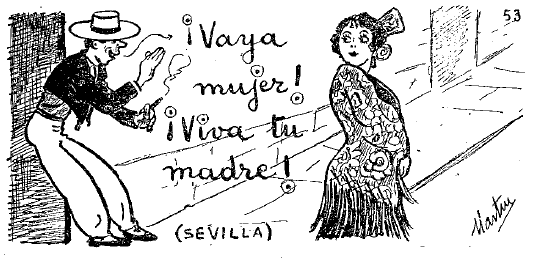
| Языки :: Испанский |
| Аудио |

 |
|
 |
|
153 |
Español |
Spanish |
|
Lección Cincuenta y tres (53) |
||
| ¡Vaya tipos! (1) | What toppers! | |
| 1 |
Un arreglo. — Pero ¿cuándo va a pagar usted? Yo no puedo venir a cobrarle (2) todos los días. |
An arrangement. — But when are you going to pay? I can't come here to be paid every day. |
| 2 | Dígame qué día es más a propósito para usted. | Tell me which day is most convenient for you. |
| 3 |
El lunes. — Bueno; pues venga (3) usted todos los lunes. |
Monday. — Good, then come every Monday. |
| 4 |
Se había equivocado. — La criada quiere marcharse. — ¿Por qué? |
He had been mistaken. — The maid wants to leave. — Why ? |
| 5 | Dice que esta mañana, por teléfono, la has insultado groseramente. | She says that this morning on [by] the phone, you have grossly insulted her. |
| 6 | Sí, es verdad; pero es que creía que eras tú. | Yes, it's true; but (that) is because [that] I thought it was you. |
| 7 |
Una indirecta. — Hombre, siempre que le encuentro a usted me acuerdo de González (4). |
A word to the wise [an "indirect one"]. — You know (hombre) every time [always that] I meet [at] you, I remember [of] G. |
| 8 | ¿De González? Si no nos parecemos nada (5). |
[Of] G.? But we resemble each other in nothing! |
| 9 |
¡Oh! ya lo sé. Pero es que él también me debe veinte duros. |
Oh I know it indeed [already]. But (that) is because [that] he also owes me 20 d. |
| 10 |
La prueba. — ¿Conoce usted a mi mujer? — No tengo ese gusto. |
The proof. — Do you know [at] my wife? — I have not this pleasure |
| 11 | ¿Gusto? Vaya, ya veo que no la conoce usted. | Pleasure! Come, I see indeed [already] that you don't know her! |
| EJERCICIOS | EXERCISE : | |
| 1 | Me marcho a Zaragoza dentro de unos días. | I leave for Saragossa within a few days. |
| 2 | ¿Se quedará usted mucho tiempo allí? | Will you stay there long? |
| 3 | Nada más que un día; voy a cobrar mil quinientos duros que me deben; |
No[thing] more than one day; I go to receive 1500d. that they owe me; |
| 4 | estaré de vuelta a principio de la semana que viene. | I shall be back at the beginning of next week [w. that comes]. |
| 5 | Tengo que hablarle de un negocio que puede interesarle. | I have to speak to you of an affair which may interest you. |
| 6 | Pues vaya usted a mi oficina una mañana. | Well come to my office one morning. |
| 7 | ¡Qué día es más a propósito para usted (or : le conviene más a usted) ? | Which day is most convenient for you (or suits you best)? |
| 8 | Es igual; para más seguridad, avíseme por teléfono el día antes. | It doesn't matter [it's equal]; to be double sure [for more assurance], let me know [advise me] on [by] the phone the day before. |
| NOTES. | |
| 1 |
¡Vamos!, Let's go!; ¡Vaya!, ¡Anda!, Go! (from andar, to go, walk) are interjections like ¡ Hombre ! — ¡Vaya mujer!, That's a woman ! |
| 2 | Cobrar, to receive money, here cobrarle, as one would say : verle; see you : make you pay. |
| 3 |
Venir is irregular; yo vengo, I come; usted viene, you come; venga or venga usted, come! |
| 4 |
Acordarse, to remember. As in encontrar, the o changes to ue when stressed. — Siempre que or cada vez que. |
| 5 | Si is here like pero or pues. |
| Sent. 4 : estaré and not seré : changing of place. |
